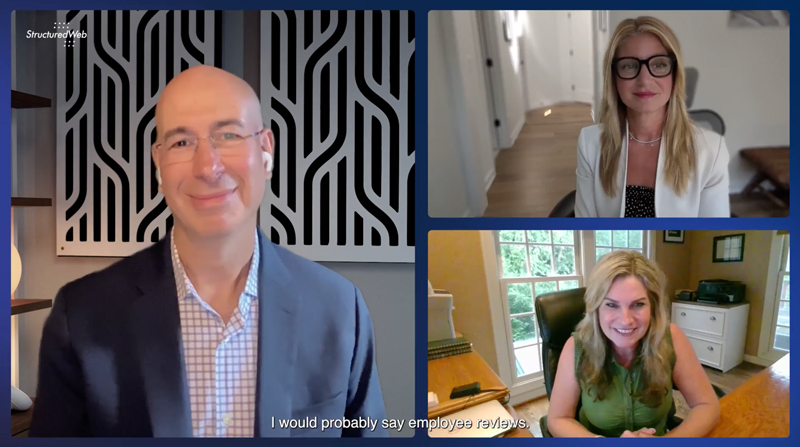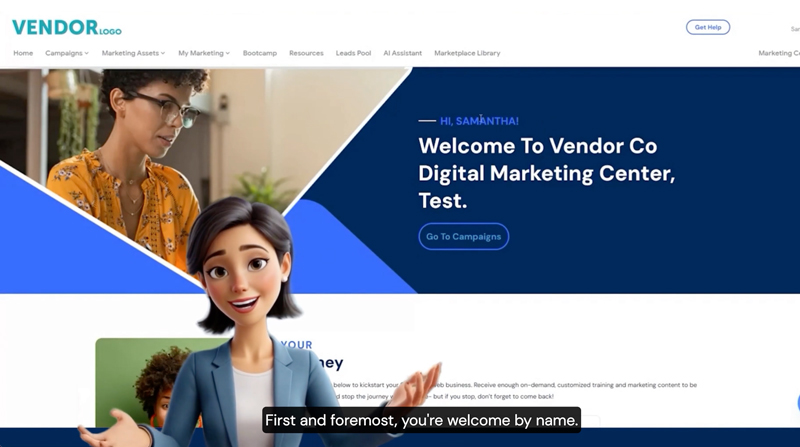
Author: Steven Kellam, Chief Revenue Officer - StructuredWeb
I had the opportunity to attend the Channel Marketing Association’s AI in the Channel Virtual Summit last week, and I thought it would be worthwhile to share some of my thoughts, as it was one of the most insightful events I’ve participated in lately. I added some specific quotes that I loved from each session for you to enjoy :) The sessions were practical, forward-looking, and full of real-world takeaways for anyone working in or around the channel.
Simplicity, Scale, and the New ‘Just Ask’ Partner Experience
Allow me to start with the enlightening sessions delivered by our own Daniel Nissan, CEO of StructuredWeb, and Diane Brode, Senior Director of Global Partner Marketing at Dell Technologies, and our own Sam Oliff, Head of Global Sales at StructuredWeb, with his avatar side-kick, Samantha.
In a panel discussion moderated by Liz Whelan, Founder and CEO of LWPR Consulting, Daniel and Diane explored how AI is transforming the partner experience from the ground up. The conversation focused on reducing friction, speeding up execution, and enabling scale without sacrificing personalization.
Daniel emphasized that AI should not overwhelm partners with more complexity. Instead, it should empower them to move faster and make smarter decisions using tools that are intuitive and directly embedded into their daily workflows.
“AI is only effective when it's invisible. The goal is not to add steps, it's to eliminate barriers so partners can market with confidence.” - Daniel Nissan

Diane spoke to the importance of balancing innovation with enablement. She noted that while AI opens the door to more dynamic co-marketing, vendors still need to ensure partners are supported, trained, and aligned with the value proposition. Her takeaway: AI should enhance the partner journey, not complicate it.
“We need to make it as easy as possible for partners to engage. If AI can remove the guesswork and help them get campaigns out faster, that's a win for everyone.” - Diane Brode
The concepts from the panel were brought to life in a hands-on session led by Sam Oliff, Head of Global Sales at StructuredWeb, and his digital co-presenter, Samantha, an AI-powered avatar. Together, they demonstrated how StructuredWeb’s ChannelGPT suite allows partners to generate, localize, and launch campaigns simply by asking. The walkthrough included email generation, industry-specific adjustments, design customization, and translation in a single workflow.
“This is what partner enablement looks like when AI meets usability. No code. No wait times. Just action.” - Sam Oliff

StructuredWeb’s sessions made clear that the future of channel success will not be defined by more tools, but by smarter systems that help partners get to market faster and with greater precision.
Setting the Strategy for AI in the Channel
Maria Chien, VP and Principal Analyst at Forrester, held a great conversation with Kathryn Rose, tackling the real-world implications of AI for channel marketers. Maria delivered a clear-eyed assessment of where we are and where we're heading. She stressed that AI is not just an emerging tool; it’s a strategic lever that will separate leading channel organizations from those that lag behind.
She emphasized that while many vendors are still experimenting with AI in isolated use cases, the true value lies in connecting AI to buyer insights, partner experience, and revenue impact. Maria’s framing helped the audience look past shiny tools and toward measurable business outcomes.
“The winners in this next phase will be the ones who ask: how is AI improving our buyer and partner experience, not just our campaign metrics?” - Maria Chien
Maria also challenged the industry to close the gap between AI hype and operational execution, noting that success depends on not just data and tools, but also organizational alignment and cultural readiness. Her insights set the tone for a summit focused on not just innovation, but intentionality.
AI in Channel Marketing: Practical Tools and Strategic Shifts
Kathryn Rose, CEO of ChannelWise and co-founder of the Channel Marketing Association, opened her solo session with a clear challenge to channel marketers: AI isn't coming, it's here. And it's your job to figure out what to do with it. Her presentation walked through practical, tested AI use cases she’s implemented in her own business, from prospecting and copywriting to summarizing calls and automating follow-ups.
One standout example: she showed how combining tools like ChatGPT with personalized LinkedIn outreach helped her secure 35 high-value meetings in just 3 weeks — without sending a single cold email.
“We're all looking to be more productive. AI helps you do what you're already doing faster, better, and at scale.” - Kathryn Rose
She emphasized that starting small and purposeful is key, and also issued a strong caution to always validate AI outputs and make sure they align with your brand voice, message, and compliance guidelines.
In a complementary session, Khali Henderson, Chief Content Officer at BuzzTheory, unpacked how AI is changing the rules of digital engagement. Her presentation centered on how generative AI tools are replacing traditional search behavior, and what that means for content strategy.
“Traditional search traffic is dropping fast. But AI-driven search is growing, and it converts better. You need to start optimizing now.” - Khali Henderson
Khali introduced the concepts of Answer Engine Optimization (AEO) and Generative Engine Optimization (GEO), pointing to the need for vendors and partners to create content that AI tools can read, summarize, and elevate. Her recommendations included structuring content for clarity, using schema markup, and tracking performance through new metrics like AI mentions and citations.
Her closing message emphasized that marketers who shift their content strategy now will be visible in the new AI-driven buying journey, while others may find themselves left out of the conversation entirely.
AI in Channel Sales: Turning Real Data into Real Deals
In the session Real AI for Real Sales Teams, Jennifer Bleam, founder of MSP Sales Revolution, led a focused discussion with Satya Jena, Chief Digital Transformation Officer at Proofpoint, and Tim Golden, CEO of Compliance Scorecard. The conversation tackled a key question: how can channel sellers use AI to drive real results, not just save time?
Satya Jena emphasized that the power of AI lies in operationalizing it across the entire sales motion. He explained how Proofpoint is using AI to identify behavioral signals that indicate whether a deal is progressing or stalling, and then enabling sellers to act proactively.
Tim Golden added that AI gives salespeople a major assist, but only if they take ownership. He shared how Compliance Scorecard uses AI to surface critical data points during calls, shorten research time, and improve message accuracy for both internal teams and partners.
“AI isn’t going to do your job for you. But it will make the best sellers even better if they use it consistently.” - Tim Golden
In her solo session, The Ultimate Objection Playbook, Jennifer went even deeper on how AI can help sellers systematically neutralize objections. She introduced the concept of "objection static" — the messy collection of concerns that show up in call transcripts, CRMs, and emails — and showed how AI can analyze and categorize that noise into patterns.
“You don’t need to guess at why deals aren’t closing. The data is already there. AI just makes it usable.” - Jennifer Bleam
She then walked through prompt frameworks and workflows for building living, evolving objection-handling guides. Her advice was to avoid one-size-fits-all rebuttals and instead match each objection type to a tailored talk track, using real data and context to guide the conversation.
Her main message was that AI isn’t just making sales faster. It’s making sales smarter, especially for partners who don’t always have time to create these resources themselves.
AI Leadership: Culture, Clarity, and the Confidence to Experiment
In the session AI in Action, Michelle Accardi, CEO of Liongard, sat down with Art Gross, CEO of Breach Secure Now, to talk about how executives can lead AI adoption without creating chaos. Their conversation centered on strategic clarity, cultural readiness, and enabling innovation across partner ecosystems.
Art Gross shared that one of the most important roles leaders can play is reducing the anxiety around AI. He stressed that the channel has a long history of adapting to disruptive technologies and that AI is no different, but leadership must set the tone.
“You can't just throw tools at people and hope it sticks. You need to show that it's safe to try, safe to fail, and worth learning.” - Art Gross
Michelle Accardi emphasized the value of being both bold and measured. She encouraged leaders to be specific about where AI fits in their organization’s goals and to resist the urge to jump into hype-driven tools. Her framework focused on aligning AI initiatives with partner value and team readiness.
“The technology is evolving fast. But what hasn’t changed is the need to start with a clear purpose and a real problem to solve.” - Michelle Accardi
In another standout session titled AI Without Fear, Katie Merrill, CEO of B-Lynk, offered a blueprint for how she’s embedded AI into her company’s culture, not just workflows. Katie described how she launched an internal AI challenge to spark curiosity without pressure. Her goal was to normalize AI experimentation in a way that was fun, collaborative, and low-risk.
“Everybody who participated in the challenge got a trophy. Not for performance, but for having the courage to try something new.” - Katie Merrill
Katie’s leadership approach emphasized transparency, empowerment, and practical ROI. Rather than dictate which tools to use, she created space for teams to bring forward solutions and justify them with impact.
Orchestrating the Future: How AI Connects the Channel
Jay McBain, Chief Analyst at Canalys, closed the summit by pulling the lens back on what AI means for the broader channel ecosystem. Known for his sharp predictions and deep ecosystem modeling, Jay laid out the three shifts shaping the next era of channel success: ecosystems over silos, platforms over point tools, and intelligence over instinct.
He reminded attendees that today's buyer is different. They are self-educated, digitally driven, and influenced by a constellation of ecosystem partners. Channel leaders, he argued, must respond by embracing AI not just for efficiency, but for orchestration.
“We're moving from linear sales models to partner ecosystems that are dynamic, data-driven, and interconnected. AI is the connective tissue.” - Jay McBain
Jay shared examples of how AI is already mapping buyer journeys, aligning ecosystem players, and powering marketplace-driven commerce. He challenged vendors and partners alike to stop thinking about AI as a marketing or sales tool, and start viewing it as an ecosystem enabler.
Jay’s message was clear and direct: AI isn’t just a trend to monitor. It’s an ecosystem-level disruption that will redefine what channel success looks like. Those who embrace it early will have the advantage — not just in productivity, but in relevance.
The CMA AI in the Channel Summit made it clear that AI is not just a trend to watch but a capability to build. Across marketing, sales, and leadership, speakers demonstrated how AI is already reshaping the partner experience and setting a new standard for speed, personalization, and scale. With organizations like the Channel Marketing Association leading the way in education and collaboration, the channel is well-positioned to turn AI into a lasting competitive advantage.
If you missed the event, the good news is that all the replays are available to watch for free at courses.channelmarketingassociation.com/ai-summit-replay.



